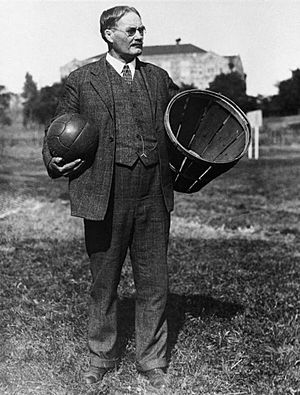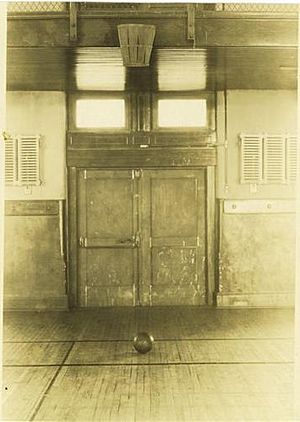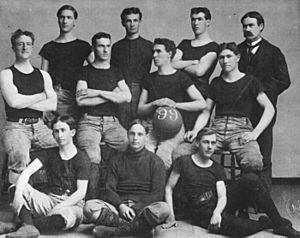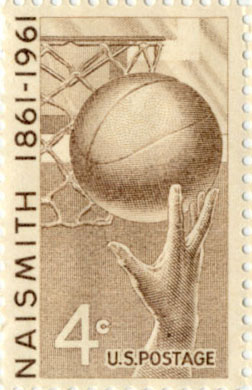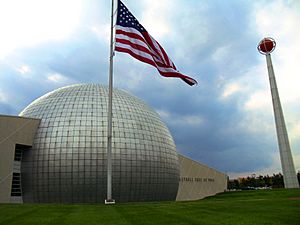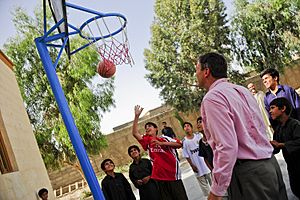James Naismith facts for kids
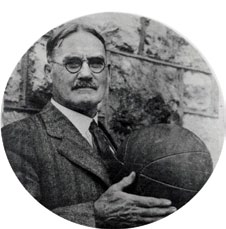
James Naismith holding a basketball
|
|
| Biographical details | |
|---|---|
| Born | November 6, 1861 Almonte, Province of Ontario, Province of Canada |
| Died | November 28, 1939 (aged 78) Lawrence, Kansas |
| Head coaching record | |
| Overall | 55–60 |
| Accomplishments and honors | |
| Awards | |
| Naismith Memorial Basketball Hall of Fame FIBA Hall of Fame Canadian Basketball Hall of Fame Canadian Olympic Hall of Fame Canadian Sports Hall of Fame Ontario Sports Legends Hall of Fame Ottawa Sports Hall of Fame McGill University Sports Hall of Fame Kansas State Sports Hall of Fame Inventor of basketball |
|
James Naismith (November 6, 1861 – November 28, 1939) was a Canadian and naturalized American sports coach and innovator. Naismith invented the sport of basketball in 1891. He is also said to have introduced the first football helmet.
Naismith wrote the original basketball rulebook and started the University of Kansas basketball program. He taught at the University of Kansas (KU) and was a part-time basketball coach from 1898 to 1907. He was also the Athletic Director for the Kansas Jayhawks, the sports teams at KU. He lived to see basketball become an Olympic demonstration sport in 1904 and an official event at the 1936 Summer Olympics in Berlin.
Contents
Early years
Dr. Naismith was born in 1861 in Ramsay Township (now Almonte), Ontario. His parents were both from Scotland.
Naismith was not good at school but enjoyed farm work. He usually spent his days outside playing catch, hide and seek, or duck on a rock. This is an old game in which a person guards a large stone from other players who try to knock it down by throwing smaller stones at it. Naismith soon found that a soft lobbing throw was often much better than a straight hard throw in this game. This thought was later very important when he invented basketball.
When he was nine, his parents died. Naismith lived with his grandmother and his uncle for many years.
He went to grade school at Bennies Corners near Almonte, then Almonte High School from which he graduated in 1883.
McGill University
In the same year, Naismith entered McGill University in Montreal. He was described as quite thin, 5 foot 10½ inches tall, and weighing 168 pounds. He was a talented and quick-moving athlete who played for McGill in Canadian football, soccer, and gymnastics. He played center on the football team, where he wore the first football helmet. Naismith won many Wicksteed medals for outstanding gymnastics performances. He earned a BA in Physical Education (PE) in 1888 and a Diploma at the Presbyterian College in Montreal in 1890.
Beginning in 1891, Naismith taught physical education and became the first McGill director of athletics. He left Montreal to become a physical education teacher at the YMCA International Training School in Springfield, Massachusetts.
Springfield College: Invention of "Basket Ball"
At Springfield YMCA, Naismith found teaching difficult. His class was restless and irritable because they had to stay inside in the winter.
The leader of the Springfield YMCA Physical Education told Naismith to make up a game that could be played inside and would be a good "athletic distraction." He told Naismith that it should not need too much room, help the athletes keep healthy, and be "fair for all players and not too rough."
Naismith was guided by three main thoughts:
- He saw the danger of a small, fast ball and decided that a soccer ball would be safest.
- He realized that the physical contact in a sport came from moving with the ball, so he decided that passing was the only way to move the ball.
- He further reduced physical contact by putting the unguardable goal high above the players' heads. He remembered his favorite game, duck on a rock, and made players throw a soft lobbing shot to score goals.
Naismith called this new game "Basket Ball" and wrote down the 13 basic rules. The first game of "Basket Ball" was played in December 1891. Each team had nine players and used a soccer ball. The goals were a pair of peach baskets. The first rules did not include what is now called dribbling. Since the ball could only be moved up the court with a pass, early players tossed the ball over their heads as they ran up court. Following each "goal," a jump ball was taken in the middle of the court. Both practices are no longer used in the rules of modern basketball.
By 1892, basketball had grown so popular on campus that the editor-in-chief of The Triangle, the Springfield College newspaper featured it in an article called "A New Game." People wanted to name the new game "Naismith Ball," but Naismith refused. By 1893, basketball was introduced in other countries by the YMCA movement.
From Springfield, Naismith went to Denver, where he studied for a medical degree. In 1898, he joined the University of Kansas faculty at Lawrence, Kansas.
University of Kansas
When Naismith arrived at the University of Kansas in 1898, they started a men's basketball program. Naismith, who became the first college basketball coach, was given jobs as chapel director and physical education instructor. In these early days, most basketball games were played against nearby YMCA teams. The YMCAs across the nation played a very important part in the birth of basketball.
By 1900, there were enough college teams in the east of the U.S. that the first games between different colleges could be played. Basketball became a demonstration sport at the 1904 Games in St. Louis, Missouri.
Later years
In 1935, the National Association of Basketball Coaches collected money so that the 74-year-old Naismith could see the introduction of basketball into the official Olympic sports program of the 1936 Summer Olympic Games. During the Olympics, he was named the Honorary President of the International Basketball Federation.
When Naismith returned, he commented that seeing the game played by many nations was the greatest payment he could have received for his invention. In 1937, Naismith helped form the National Association of Intercollegiate Basketball, which later became the National Association of Intercollegiate Athletics (NAIA).
Naismith became an Emeritus Professor (an emeritus is a retired college professor or minister) in Kansas and retired in 1937 at the age of 76. Including his years as coach, Naismith served as athletic director and faculty at the school for a total of almost 40 years.
Personal life
Naismith was not interested in self-promotion nor in the glory of competitive sports. Instead, he was more interested in his physical education career, receiving an honorary PE Master's degree in 1910. He also patrolled the Mexican border for four months in 1916 during World War I, traveled to France, published two books (A Modern College in 1911 and Essence of a Healthy Life in 1918), and became an American citizen in 1925.
On June 20, 1894, Naismith married Maude E. Sherman from Springfield. The couple had five children. Maude Naismith died in 1937, and on June 11, 1939, Naismith married his second wife, Florence Kincaid.
Death
Naismith died in 1939 in his home located in Lawrence, Kansas, he was 78 years old. Naismith is buried in Memorial Park Cemetery in Lawrence, Kansas. After his death, his masterwork Basketball — its Origins and Development was published in 1941.
Legacy
In Lawrence, Kansas, James Naismith has a road named in his honor, Naismith Drive, which runs in front of Kansas University's basketball arena. The university also named a court James Naismith Court in his honor. There is also the Naismith Memorial Hall of Fame in Springfield, Massachusetts, named after him.
Basketball is played today by more than 400 million people worldwide, making it the second-most popular team sport. In North America, basketball has produced some of the most-admired athletes of the 20th century. Polls conducted by ESPN and the Associated Press named basketball player Michael Jordan the greatest North American athlete of the 20th century.
James Naismith quotes
- "Be strong in body, clean in mind, lofty in ideals."
- "I want to leave the world a better place for me having been here."
- "I am sure that no man can derive more pleasure from money or power than I do from seeing a pair of basketball goals in some out of the way place."
- "Basketball doesn't build character; it reveals it."
Interesting facts about James Naismith
- James Naismith did not have a middle name.
- Naismith served as a chaplain in the Army National Guard and volunteered to be a chaplain in France during World War I.
- He was a Presbyterian minister but never pastored a church.
- The original copy of Naismith's basketball rules that was typed by his secretary was bought in an auction by David Booth for $4.34 million.
- His wife, Maude, played in the first women's basketball game at Springfield College.
- Naismith had the worst record as a basketball coach in the University of Kansas program (55 wins and 60 losses).
- He remains the only coach in the University of Kansas program with a losing record.
- One of his students, Amos Alonzo Stagg, went on to become one of the greatest football coaches in history.
- Naismith was inducted (formally placed) into eight Halls of Fame.
- The NCAA rewards its best players and coaches annually with the Naismith Awards.
Images for kids
-
Sculpture in Almonte, Ontario
-
Statue of James Naismith at Basketball Hall of Fame and Museum in Springfield, Massachusetts
See also
 In Spanish: James Naismith para niños
In Spanish: James Naismith para niños


